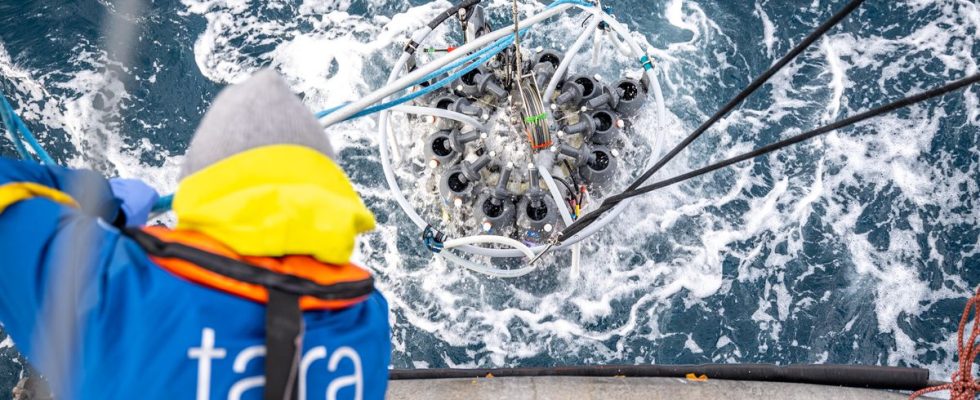After more than fifteen years of discussions, the Member States of the United Nations agreed last Saturday on a first international treaty for the protection of the high seas, a vast space which begins 370 kilometers from the coast and represents more than 60% of the oceans and almost half of the planet.
“A big step forward”, underlines Edith Earth, general manager of the European Molecular Biology Laboratory (EMBL), an international research structure that brings together 28 States. Which offers him the perfect transition to introduce Traversing european coastline (Trec)the scientific expedition that she came to present on Wednesday at the headquarters of Unesco in Paris.
Marine ecosystems at the forefront
Trec brings us back along our coasts, this strip of sea that we know best because the most accessible. “Marine biologists, evolutionary and developmental biologists and many others have studied the organisms and ecosystems in which they live,” recalls EMBL.
But it’s worth keeping an eye out for. Especially since our world is changing faster and faster and exposing these coastal marine ecosystems, in direct contact with human activities, to increasingly strong pressures. Plastic pollution, climate change, but also chemical pollution. “Anything that is put directly or indirectly into the water”, includes Edith Earth. From pesticides to hormones, through drugs or components of sunscreens.
This is the challenge of this Trec expedition: “Measuring and understanding these changes and the impact they have on coastal marine ecosystems”, sums up Romain Troublé, general manager of Tara Oceana scientific foundation embarked on the adventure.
A tour of Europe of 18 months and 46 stops
She will leave on April 2 from Lorient (Morbihan), the home port of the schooner Tara. It is this ship, a small floating laboratory of Tara Ocean, which will ensure the “marine” aspect of Trec. He will sail the European coasts for eighteen months, from Roscoff (Finistère) to Talinn (Estonia)and of Kristineberg (Sweden) to Athens (Greece).
This tour of Europe will pass through 120 sampling sites, focusing on all the organisms that live there. “From viruses to animals,” says Flora Vincent, team leader at EMBL And not just at sea, she continues. This is one of the pluses of this Trec expedition. The schooner will be paired with what EMBL calls an “advanced services platform”. Clearly: a truck converted into a state-of-the-art laboratory which will also make a (land) tour of Europe, finding the schooner at 46 meeting points in 22 countries. Together, and with the support of local scientific institutes, they will carry out “transects”. “A straight line of samples that will start 300 meters inland to waters further offshore, with Tara explains Flora Vincent. And to complete these soil and water samples, we will study the aerosols and a large number of environmental parameters, from temperature to precipitation, including acidity and oxygen levels in the water. »
Take advantage of the land-sea association
In all, 120 transects are planned, involving many disciplines. “Genetics, microscopy, chemistry, oceanography…”, list Flora Vincent, who makes the richness of the project. “Just aboard Tara, we will follow for each sampling site 80 different protocols to sample the chemical components, pollutants, genes, proteins present in the samples, adds Colomban de Vargas, director of the scientific committee of Tara Ocean. We will also bring fresh plankton [des organismes microscopiques] to the EMBL mobile laboratory which will follow us on earth; he will be able to carry out very detailed analyzes of the molecular and cellular structures of this plankton. This is not a detail for Flora Vincent, which makes her a major strength of Trec. “We will bring to the field, as has rarely been done, some of the most advanced scientific instruments,” she says. Not only local researchers from the more than 150 partner institutes of this expedition will benefit. But we can also analyze the organisms taken right away, without adding chemical fixatives as we usually do to preserve the samples until they reach the laboratory, with the risk that this will distort the analyzes somewhat. »

The beginning of a scientific adventure
So what should we expect from this Trec expedition? Flora Vincent already hopes that it will lead to the discovery of “new species”. More likely on the side of microscopic organisms, “essential bases of many food chains”, she explains. But the primary goal of Trec is to contribute to the understanding of the impact of pollution and global climate change on these coastal ecosystems and the societal challenges that these interactions pose. “Can antibiotic resistance, for example, be transmitted from land to sea? », Illustrates Flora Vincent.
Anyway, it will take patience to measure all the scientific benefits of Trec. These 18 months of expedition are even to be seen as a first, intended above all to store data with the hope that scientists will then rely on it in their research projects. Colomban de Vargas draws a parallel with a previous expedition of the schooner Tarabetween 2009 and 2013, already to study the microscopic organisms of the oceans. So off this shot. “We had brought back a treasure of 40,000 samples which fed numerous scientific publications and which continue to be analyzed today, he says. It is largely this work that has provided a fairly accurate idea of the diversity of single-celled organisms in the upper layer of the oceans”. And which is undoubtedly also for something in this international treaty on the high seas won on Saturday.

